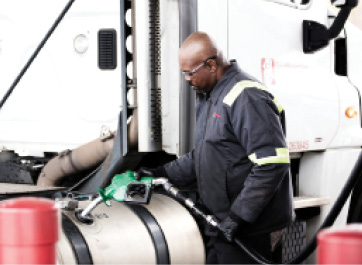The formulation of diesel fuel and its preferred method of combustion in diesel engines have undergone a number of significant changes in the past decade. These changes present a series of new challenges for fleet operators, such as those in the ready-mix concrete business, who must satisfy their demands if they are to keep fleets rolling and out of the maintenance bay.
|
|
| The ultra-low sulfur diesel era has ushered new fuel handling and quality control measures for heavy-duty fleet managers. Injection components and methods at the heart of new diesel engines are especially sensitive to particles and other contaminants common to ULSD. |
From a fuel perspective, two trends have helped shape today’s diesel-fuel market. The first occurred in 2006 when the U.S. Environmental Protection Agency mandated that all diesel fuel available in the country would need to be ultra-low-sulfur diesel (ULSD). Since 2010, all highway diesel fuel sold and consumed in the U.S. has been of such formulation.
Secondly, concurrent with the implementation of the ULSD mandate, was the increase in the use of biodiesel. Consumption of the alternative fuel in the U.S. reached 1.5 billion gallons in 2015, with the Department of Energy’s Alternative Fuels Data Center predicting that domestic production of biodiesel will reach 12 billion gallons by 2020.
While these modifications in the diesel-fuel market were taking place, diesel engine manufacturers were also developing new ways for their products to burn fuel. Traditional diesel engines used a low-pressure pump to feed the fuel to a series of unit injectors, or pump nozzles. Next-generation diesel-engine technology relies on what is known as a “common rail fuel-injection system” consisting of a high-pressure fuel rail (which operates at more than 14,500 psi, or 1,000 bar) to feed the fuel to a series of solenoid valves.
COMING CLEAN
The common rail fuel-injection system has actually been a boon for diesel-engine operation because its design allows for more precise control of the amount and timing of the fuel that is injected. However, the injectors only work correctly if they are able to deliver a very precise amount of fuel at exactly the correct time in the combustion process. This critical timing can be compromised by particles in the fuel that can clog or erode injector components.
Therefore, ensuring that the diesel fuel that is used by the wide array of vehicles that inhabit a ready-mix plant or construction site—generally concrete mixers, tractor-trailers, front-loaders, waste collectors, water tankers and pick-up trucks—is a front-of-mind concern for the fleet operator. It is also easier said than done.
While construction sites are dirty places with lots of flying dust and debris that can enter the fueling system, the cleanliness level of the diesel itself is also a primary concern, as fuel dropped from a transport truck is normally too dirty for today’s highly sensitive fuel injectors. Additionally, the performance of biodiesel can be adversely affected by a number of outside forces, most notably water. The presence of water in the fuel can cause harder starting, corrosion of fuel-system components, microbial growth, piston pitting and, in extreme-weather conditions, gelling of the fuel.
With all of these potential pitfalls to consider and avoid, ready-mix fleet operators would be wise to incorporate a Clean Diesel fueling program into their operations. The main objective of any such program should be to prevent the diesel fuel from generating internal contamination and damage to the fueling system. To accomplish this, the program must eliminate fuel-storage instability, prevent rust and corrosion, halt the growth of any microbial contaminants, and stem potential fuel gelling and waxing.
Under normal conditions, diesel fuel can be stored and be expected to remain in a useable condition for at least 12 months at an ambient temperature of 68°F (20°C), or for six to nine months at a temperature higher than 86°F (30°C). While those are baseline values, the diesel-aging process can be accelerated by the presence of water, which allows the growth of fungus and bacteria and, if left unchecked, organic acids that will create fuel instability. Also, consistent exposure to high temperatures will result in oxidation of the fuel, while the components in some formulations of ULSD will age quicker naturally.
As mentioned, water is the bane of diesel fuel. Increased water levels, in addition to harming the fuel itself, can lead to accelerated corrosion of a storage tank’s metal surfaces, which can generate particles that can plug and foul fuel filters, as well as the buildup of a sludge layer in the tank. Gelling occurs in untreated diesel fuel in colder weather, with the wax crystals that are created when the fuel reaches its cloud point capable of clogging high-efficiency fuel filters.
Therefore, a successful Clean Diesel program must include the use of fuel additives that possess the capability to stabilize the fuel by eliminating microbial growth, preventing the occurrence of rust and corrosion, and neutralizing any water incursion that might take place. In addition, a high-quality filtering system should be used at both the delivery end of the storage tank and at the fuel-dispensing end of the process to ensure that any harmful contaminants or particulates don’t reach the vehicle’s fueling system. Finally, the diesel inventory must be tested on a regular basis in order to validate its cleanliness.
In the end, ready-mix fleet operators will ensure that the operation of their vehicles are not compromised by creating and adhering to a Clean Diesel program that helps guarantee that the fuel remains clean from the storage tank to the fuel-injector nozzle. This means regularly inspecting storage tanks, treating the fuel with additives and improvers, and installing a filtration system that can capture harmful contaminants and ensure desired cleanliness levels.
Peter Cochefski is the director of Ryder Fuel Services, Houston, a subsidiary of Ryder System, Inc., and can be reached at 281/647-8900, ext. 222, or [email protected]. Ryder Fuel Services specializes in alarm, compliance and fuel management; remote monitoring; and, environmental best practices.
